Tingling Scalp: 12 Causes And 7 Home Remedies
Exercising and sleeping well are a few ways to tackle the prickly feeling on your scalp.
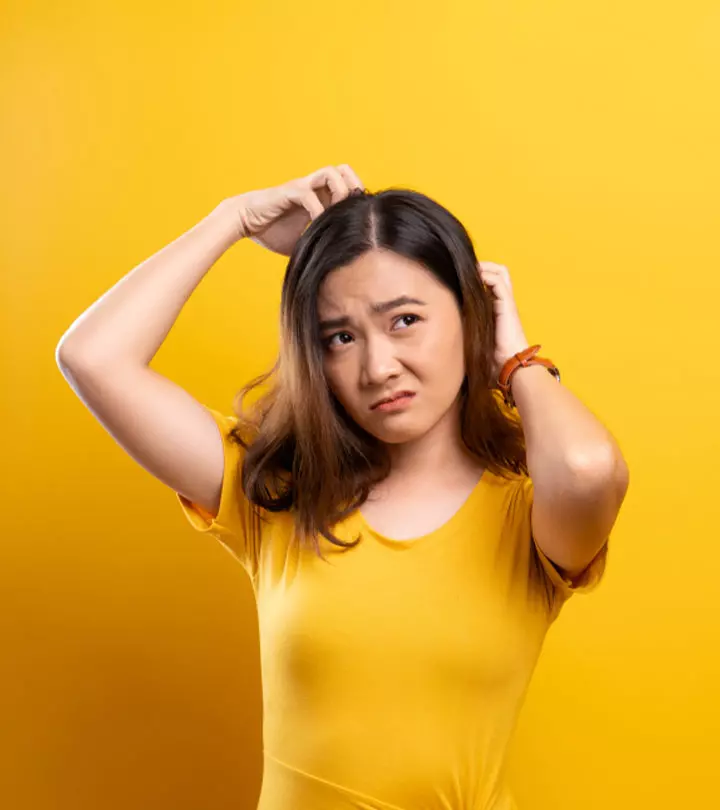
Image: Shutterstock
A tingling scalp can be very irritating at times, particularly when you have people around you. This ‘pins-and-needles’ sensation on your scalp is the result of a benign and temporary condition called paresthesia.
But why does this condition occur? Does it imply an underlying condition that requires immediate attention? Does it cause any hair loss? In this article, we will answer all your queries about tingling scalp and list a few home remedies you may consider to treat this condition. Let us get started.
In This Article
What Is The Tingling Sensation On The Scalp? What Does It Mean?
You may be acutely familiar with the “pins-and-needles” and tingling sensation on your legs when you suddenly move after sitting in the same position for long. That tingling sensation is a result of paresthesia. It may occur on any body part, including the scalp. A tingling sensation on the scalp is caused by scalp sensitivity. It is often accompanied by prickling and burning sensations (1).
Paresthesia can be temporary (acute) or recurring (chronic). There is no scientific diagnosis of paresthesia. However, your scalp may become sensitive due to (1):
- Physical factors like UV, heat, cold, and wind exposure
- Chemical exposure (cosmetics, soap, and water)
- Psychological factors like stress
Tingling sensations on the scalp can also be associated with various scalp problems. In the next section, we have explored the causes in detail. Keep scrolling.
Key Takeaways
- You may experience a tingling sensation on your scalp if you scalp sensitivity that may occur due to factors like heat exposure, chemicals in products, and stress.
- Some other possible causes of this sensation include skin conditions like seborrheic dermatitis, diabetes, and sinus infections.
- It may also be a sign of damage to hair follicles and hair loss.
- Patch testing your haircare products, eating balanced meals, and exercising regularly are some ways to manage this condition.
Possible Causes Of Tingling Sensation On The Scalp
1. Seborrheic Dermatitis
Seborrheic dermatitis is a common skin condition that may possibly cause a tingling sensation on the scalp due to inflammation and irritation.
A blogger dealing with seborrheic dermatitis shared her experience and the discomfort owing to that. She said, “Before long, my scalp was overrun with flakes and scabs. In fact, the area on my head expanded and grew, positioning itself exactly as if I were wearing a cap (i).” The blogger further stated that it spread to the edges of the hairline to the point that even her hair follicles were not visible.
Seborrheic dermatitis condition may also disrupt the skin’s natural barrier, making the scalp more sensitive to various stimuli. However, there is currently no scientific evidence to support this.
2. Folliculitis
Folliculitis manifests as small, red, and sometimes pus-filled bumps on the scalp. This condition is often caused by bacterial or fungal infections, which may cause irritation and discomfort. As the follicles become more inflamed, it may cause a tingling or burning feeling on the scalp. However, scientific studies are warranted to prove this link.
3. Cold Or Sinus Infections
Facial and scalp tingling may be triggered by nerve compression or damage caused by cold or sinusitis.
The sinuses are an interconnected system of cavities located behind the nose, cheeks, and forehead. When you contract respiratory infections, such as the flu, cold, or sinusitis (inflammation of the sinuses), the sinuses swell up. The enlarged sinuses compress the surrounding nerves, triggering a tingling sensation on your face and scalp (2).
4. Anxiety Or Stress
Anxiety or stress could also lead to a tingling sensation on the scalp.
Chronic stress can trigger pain and inflammation. During stressful situations, your amygdala (a collection of cells near the brain’s base) sends signals to release stress hormones and prepares your body for a fight or flight response.
Often, false beliefs regarding the stressor may exaggerate your psychological stress response, initiating pain or prolonging an existing pain (3). The same mechanism may cause scalp tingles.
5. Headaches And Migraine
Migraine is associated with “migraine aura,” which causes a tingling sensation on the head and the face (4). Migraines and headaches alter the way the blood flows into the head and the scalp. This can cause a combination of hypoesthesiai An abnormal sensory response characterized by a decreased perception of stimuli like touch, vibration, or cold temperature. , dysesthesiai A condition caused due to nerve damage that distorts the sensation of touch and causes an ordinary stimulus to be unpleasant and painful. , paresthesia, or tenderness (5).
6. Diabetes
Untreated diabetes could cause nerve damage (diabetic neuropathy), typically in the peripheral regions, such as the legs.
However, it could also cause focal neuropathyi Damage to the peripheral nerve endings that causes weakness, numbness, pain, and tingling sensation in the hands and feet. , damaging the single nerves in the head, torso, or limbs (6). Hence, it could lead to headaches and tingling on the scalp (7).
7. Side Effect Of Drugs And Medications
Prescription medicines, such as chemotherapy drugs, high blood pressure medicines, and anticonvulsantsi A class of drugs that help normalize nerve impulses and help in the prevention and treatment of seizures. , may cause a tingly scalp. Recreational drugs (various forms of cannabis) and substance abuse (alcohol and tobacco) may produce psychological sensations, including a tingling scalp. Scientific research to explain this phenomenon is underway, and there is no concrete evidence for it currently.
8. Head Injuries
The relation between scalp tingles and head injuries is pretty straightforward and obvious. Head injuries may cause nerve damage and result in recurrent scalp numbness and tingling.
9. Multiple Sclerosis
Multiple sclerosis (MS) is a progressive degenerative disorder where the body attacks the central nervous system (CNS). This condition causes neuropathic pain and continuous burning, tingling, and aching sensations (8).
Similarly, neurodegenerative diseases, such as Alzheimer’s and Parkinson’s, may also cause a tingling sensation on the scalp.
10. Epilepsy And Seizures
Those who have epilepsy may experience partial focal seizures (such as Jacksonian seizures). These seizures are characterized by unusual electrical activity localized to a small part of the brain. As a result, an individual may experience consistent tingling, numbness, burning, and prickling sensations in the head or facial region (9).
11. Autoimmune Disorders
Autoimmune disorders cause the body’s immune system to attack the surrounding cells and tissues. And quite possibly, they may also damage the nerves in the head and cause a tingling scalp.
Some autoimmune conditions that may cause a tingling scalp are:
- Fibromyalgiai A condition that causes pain and tenderness all over the body, which is accompanied by fatigue and changes in memory and mood.
- Rheumatoid arthritis (RA)
- Lupusi An autoimmune disease where the body’s immune system attacks its own tissues and organs, leading to joint pain, fever, and organ damage.
- Guillain-Barré syndromei A rare disorder triggered by acute bacterial or viral infection where the body’s immune system attacks its own nerves.
- Sjögren syndrome
12. Stroke Or Transient Ischemic Attack (TIA)
Strokes damage the nerves that may cause multiple issues like visual issues, memory problems, poor hand-eye coordination, issues with movement and sensation, and tingling scalp.
Other Causes
Other scalp tingling causes include:
- ASMR (a sensory experience that triggers tingling sensation)
- Poor posture
- Lack of head hygiene or scalp skin conditions
- Ringworm
- Head lice
- Lymei Lyme is a vector-borne disease caused by the bacterium Borrelia burgdorferi. It is also known as Lyme borreliosis. disease
- Encephalitisi An infectious disease that causes inflammation of the brain. Fungi and certain medications may lead to this ailment.
- Shinglesi Also called herpes zoster, the shingle is a viral disease. It causes skin rashes with blisters in the localized areas.
- Occipital neuralgiai A condition caused when the occipital nerves are injured. It leads to throbbing pain in the back of the head and behind the ears.
- Trigeminal neuralgiai A long-term neurological condition that leads to electric shock-like painful sensations on one side of the face.
- High blood pressure
- Vitamin B12 deficiency (10)
- Hypothyroidism (11)
- Brain tumors
 Quick Tip
Quick TipA tingling scalp may be caused by multiple issues. But, can it cause hair loss? Find out in the next section.
Can A Tingling Scalp Indicate Hair Loss?
Interestingly, tingly scalp and hair loss are related. It is one of the symptoms of alopecia areata. Several individuals reported experiencing burning, itching, and tingling sensations on the scalp around the same time when their hair fell out (1). Damage to the hair follicles may cause one or all of these sensations.
Other than scalp tingles, different forms of alopecia, such as neutrophilic scarring alopecia and cicatricial alopecia, also cause trichodynia, a painful sensation on the scalp for no apparent medical reason (12). Scalp tingling and hair loss may go hand-in-hand in rare cases.
Not all kinds of scalp tingling require medical intervention. Typically, head paresthesis goes away on its own when the pressure on the nerve is released. If you are experiencing a tingling scalp and wondering how to manage it, here are some ways.
Home Remedies And At-Home Treatments For Scalp Tingle
- Do a skin patch test for any shampoo or conditioner before using it. Avoid any hair products that may irritate the scalp and cause tingling.
- Consult your doctor if any medicine causes the tingling sensation. They may change the medication.
- Eat a balanced meal, exercise, indulge in relaxing activities, and sleep well to combat stress and anxiety.
- Maintain good sitting and sleeping postures.
- Take care of scalp health and treat scalp issues right away.
- Try using essential oils like lavender or peppermint, which have calming effects. Dilute a few drops with a carrier oil (like coconut or olive oil) and gently massage your scalp to help ease tingling and promote relaxation.
- Get regular health checkups to identify any underlying condition.
 Did You Know?
Did You Know?You can try these methods if the tingling sensation is not caused by any underlying health issue. Otherwise, consult a doctor immediately.
When Should You Seek Medical Help For Tingling Scalp?
Consult a doctor if:
- The tingly sensation on your scalp is persistent for several days.
- The scalp tingling is hampering your day to day activities.
- It is accompanied by other symptoms of heart issues, excessive hair loss, diabetes.
- If you notice the tingling sensation along with sudden weight loss or changes in your vision.
Infographic: A Simple Guide To Tingling Scalp
The tingling sensation on the scalp, also known as paresthesia, may be temporary or acute, depending on the underlying cause. We have created a simple guide to help you understand the factors behind this condition and listed simple tips to manage it. Check out the infographic below to know more!
Some thing wrong with infographic shortcode. please verify shortcode syntax
Tingling scalp is described as a “pins and needles” sensation on the scalp, often accompanied by tingling and burning sensations. Studies indicate that factors such as sinus infections, stress, or head injuries could result in tingling sensations. Additionally, hair loss has been linked to a tingling sensation on the scalp. To combat this issue, you can eat a balanced diet, sleep well, and maintain proper scalp hygiene. However, consult your doctor for further treatment if the tingling sensation persists for several days and disrupts your daily activities.
Frequently Asked Questions
Can dehydration cause tingling in the head?
Possibly not. While anecdotal evidence suggests that dehydration may cause headaches, there is a lack of evidence to suggest any link between dehydration and a tingling sensation in the head.
What does poor nutrition have to do with tingling head sensations?
Poor nutrition may lead to vitamin deficiencies, which may cause scalp irritation and tingling in the head. Anecdotal evidence suggests that deficiencies can result in inflammation, which may also lead to tingling head sensations.
Does scalp tingling indicate poor circulation?
Anecdotal evidence suggests that poor blood circulation and excess pressure on the head may result in scalp tingling.
Can scalp massages help alleviate a tingling scalp?
Yes, gentle scalp massages may reduce muscle tension and stress, which in return can alleviate a tingling scalp.
Illustration: Tingling Scalp: Causes, Home Remedies, And More
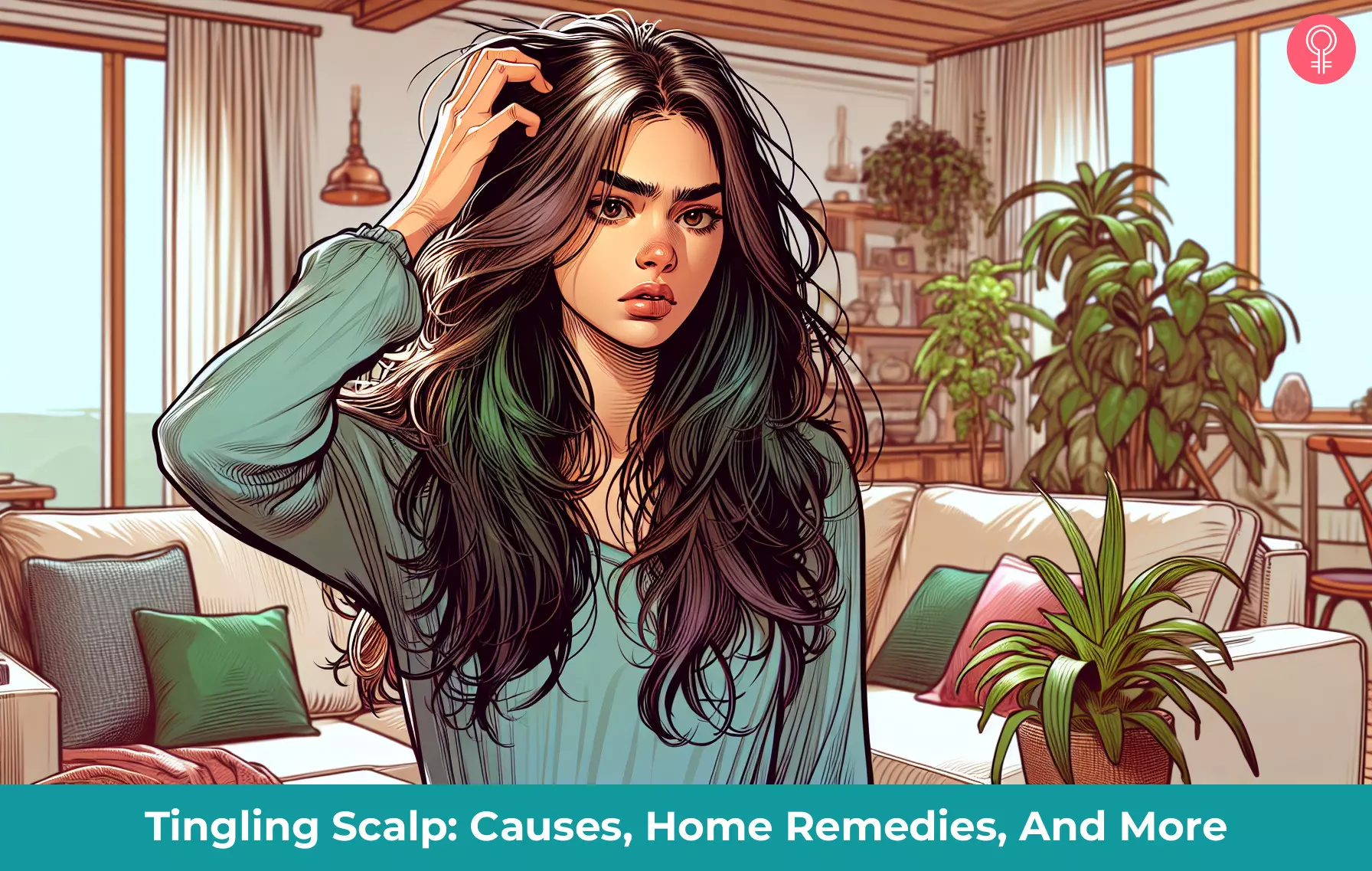
Image: Stable Diffusion/StyleCraze Design Team
References
Articles on StyleCraze are backed by verified information from peer-reviewed and academic research papers, reputed organizations, research institutions, and medical associations to ensure accuracy and relevance. Read our editorial policy to learn more.
- Sensitive Scalp
https://www.ncbi.nlm.nih.gov/pmc/articles/PMC3500070/ - Midfacial paraesthesia – An unusual presentation in paranasal sinusitis
https://jmrps.net/eJournals/_eJournals/84_CASE%20REPORT.pdf - Chronic Stress, Cortisol Dysfunction, and Pain: A Psychoneuroendocrine Rationale for Stress Management in Pain Rehabilitation
https://www.ncbi.nlm.nih.gov/pmc/articles/PMC4263906/ - Migraine with Aura
https://www.ncbi.nlm.nih.gov/books/NBK554611/ - Unusual headaches
https://www.ncbi.nlm.nih.gov/pmc/articles/PMC4117064/ - What Is Diabetic Neuropathy?
https://www.niddk.nih.gov/health-information/diabetes/overview/preventing-problems/nerve-damage-diabetic-neuropathies/what-is-diabetic-neuropathy - Headache in diabetes—occipital neuropathy
https://www.ncbi.nlm.nih.gov/pmc/articles/PMC539657/ - Neuropathic Pain in Multiple Sclerosis—Current Therapeutic Intervention and Future Treatment Perspectives
https://www.ncbi.nlm.nih.gov/books/NBK470151/ - Symptomatic and Probably Symptomatic Focal Epilepsies
https://www.ncbi.nlm.nih.gov/books/NBK2605/ - Pernicious Anemia
https://www.nhlbi.nih.gov/health/anemia/vitamin-b12-deficiency-anemia - Symptoms Underactive Thyroid (hypothyroidism)
https://www.nhs.uk/conditions/underactive-thyroid-hypothyroidism/symptoms/ - Trichodynia (Scalp Dysesthesia)
https://www.intechopen.com/chapters/54350 - Giant Cell Arteritis: 2018 Review
https://www.ncbi.nlm.nih.gov/pmc/articles/PMC6205276/
Read full bio of Dr. Shruti Chavan
Read full bio of Ramona Sinha
Read full bio of Eshna Das
Read full bio of Monomita Chakraborty





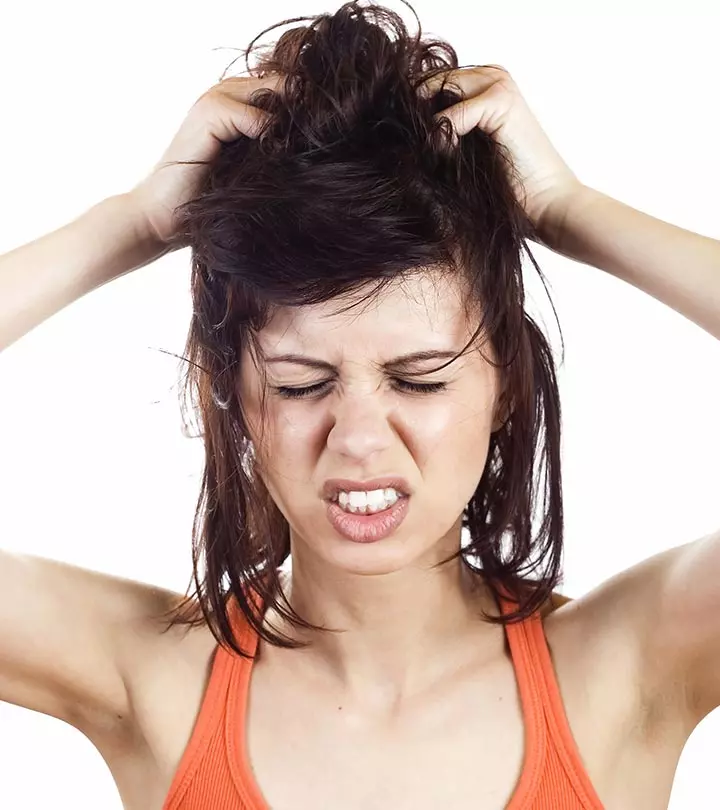

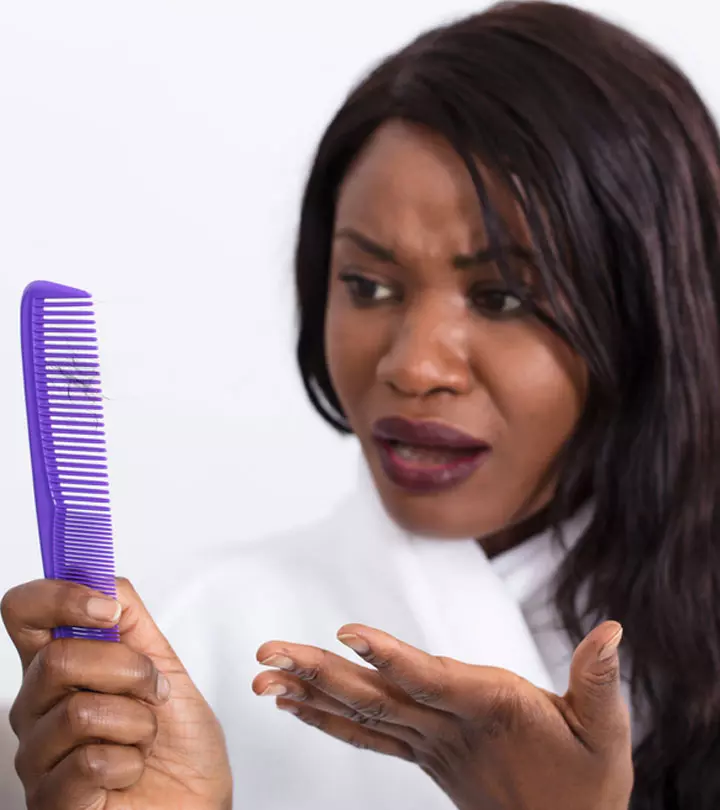
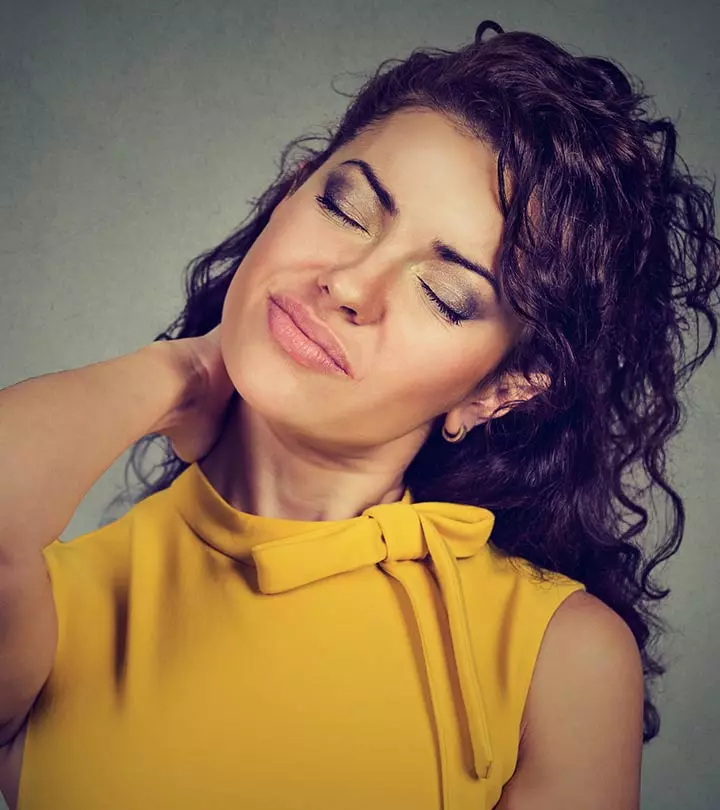


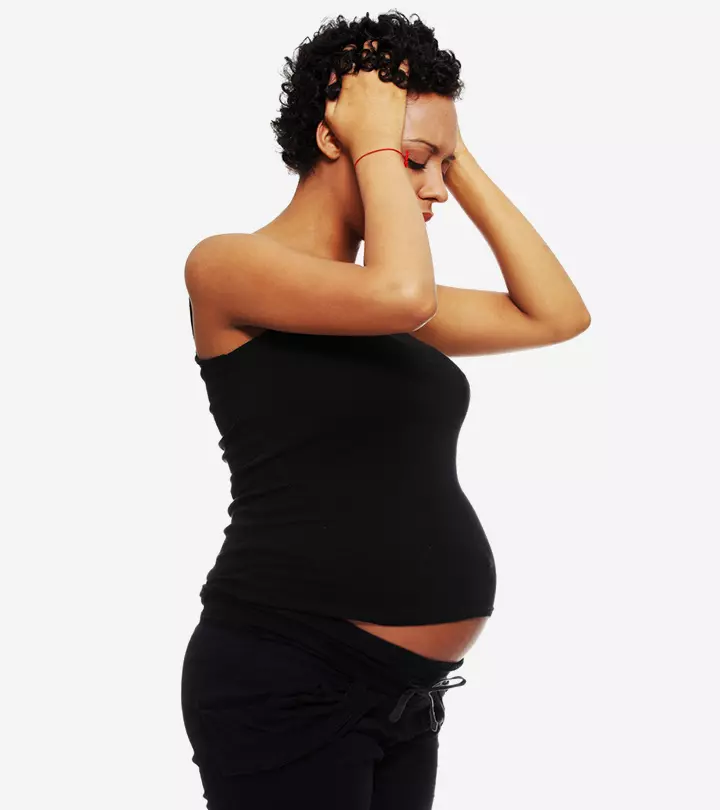
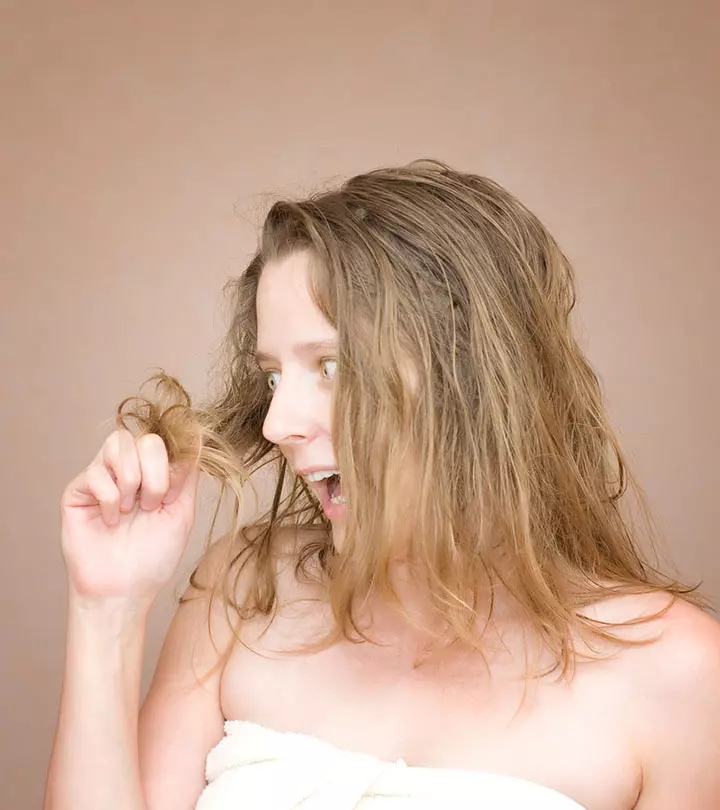
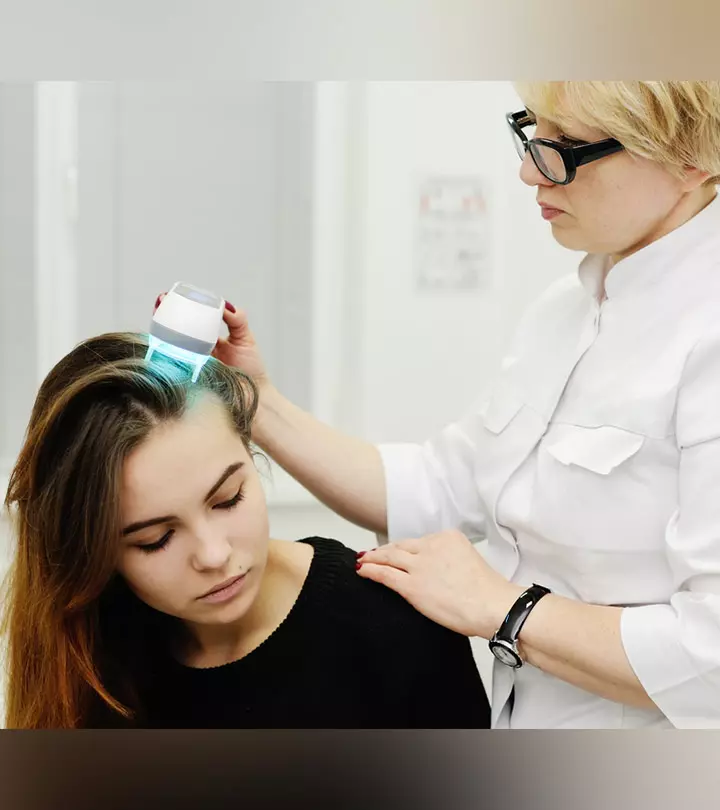


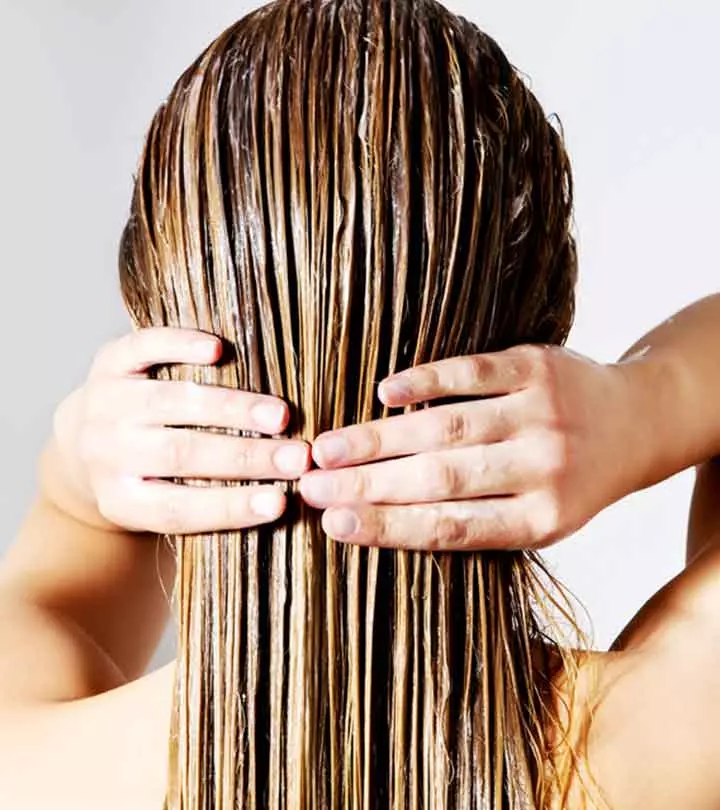

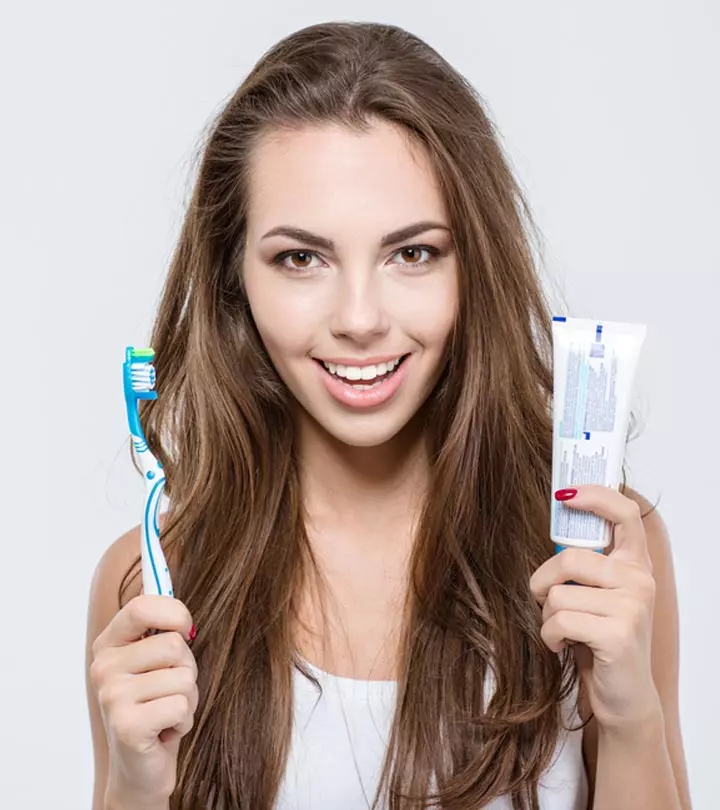



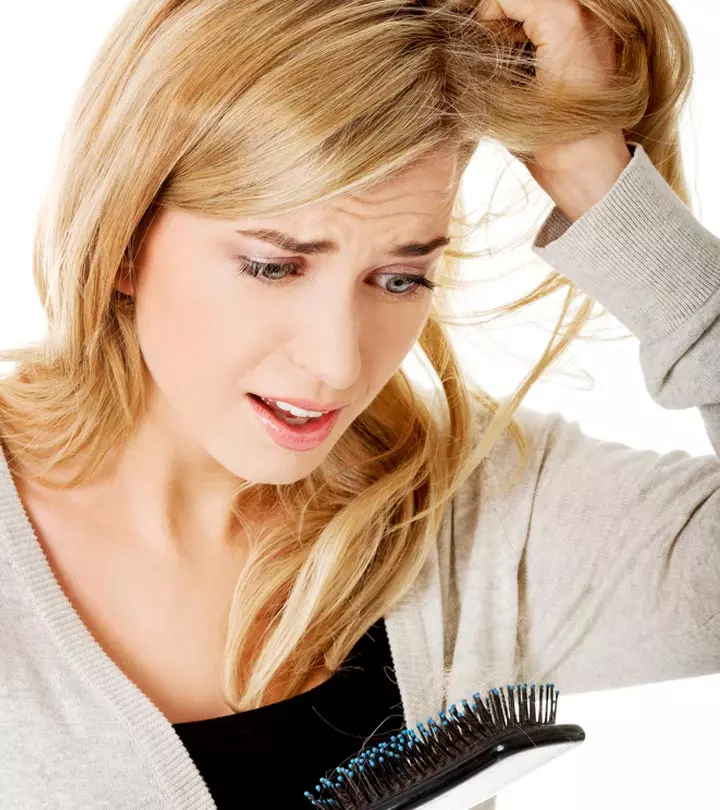




Community Experiences
Join the conversation and become a part of our empowering community! Share your stories, experiences, and insights to connect with other beauty, lifestyle, and health enthusiasts.